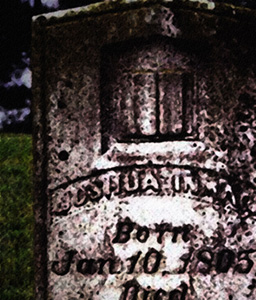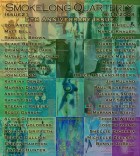They were running behind, so Nate pulled his son Joey into the break in the fence, across the broken bricks and their chipped sharp corners, lifted Joey by the arm so he wouldn’t trip, thought how light Joey felt, fleshless.
Nate looked up, around, and then stopped. Joey crashed into his hip, laughed, held his head. Stones? He had dragged Joey into a cemetery.
Blurred tombstones lay to the edge of the brick path. “Bliss,” he said. “A strange name.”
“1761 to 1768,” Joey said aloud. “Seven-year-old kids don’t die.” Joey picked at his lip, stared at Nate. “Right, Dad?”
“Well. Now they don’t. That was before medicine.” He reached in his pocket, felt the hard tube of the Epi-Pen.
Joey walked around the graveyard, looked at dates, did the math. If he ate dairy, Joey stopped breathing. They were walking along the broken brick streets, winding their way toward the hospital, to Joey’s food challenge, where they’d slowly feed him tablespoons and then glasses of milk, then wait—the oxygen and epinephrine hidden in the closets.
Twice before, Nate had rushed Joey to the emergency room, his breath shallow and losing strength. The wrong brand of Saltines. Undeclared milk in a frozen soup. He jabbed Joey in the thigh with the Epi-Pen as if filling him with oxygen. And then that car ride, Joey deflating.
Joey returned to Bliss. “I never saw a kid skeleton,” he said. Joey bent down, rubbed his hand over the stone. His finger scraped the groove of the worn-away letters and numbers.
Nate didn’t picture bones, not even tiny ones. Instead, he envisioned a white translucent presence, there and not there.
“Did they have ice cream back then?”
Nate picked Joey up, lifted him into the air. He wished he could toss him up through the milky clouds, that Joey could float down into his arms, free of the dark scabs on his lips from the constant picking, the constant wondering, the wishing that milk had lost the power to kill him.
“Well,” Joey repeated. “Did they have ice cream then?”
Bliss had fever. They buried her in mounds of ice cream, but still she grew hotter and hotter until steam, like mist off a pond, floated around her, and it grew thicker, and once it dissipated, Bliss had disappeared. They looked for her in the air, in the clouds.
Nate tossed Joey into the air. Joey screamed. And like that, Joey up and down screaming, they made their way through the city, toward the towers, and Joey said, “Dad, I don’t want to turn into bones,” and Nate said, “I won’t let you,” as if such a thing were possible.
–“The Bone Orchard” was originally published in Front & Centre. It appears here by permission of the author.


